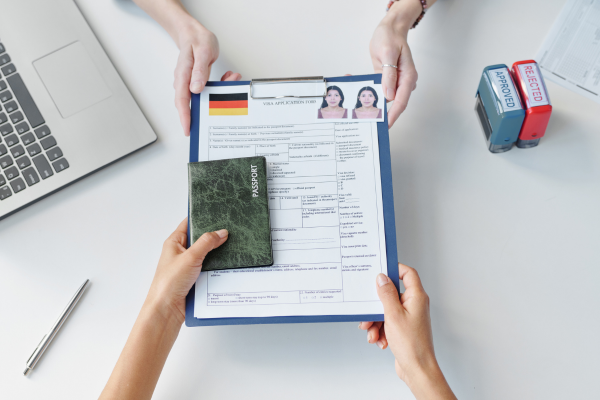Are you just settling into life in Germany? Benefit from the experiences of seasoned expats who have navigated the challenges and learned from their missteps.
Here are some of the most common mistakes expats make when adjusting to life in Germany—and how you can avoid them.
Outline:
1. Assuming Everyone Speaks English

While it’s true that many Germans, particularly in larger cities, speak English, it’s not universal. Assuming everyone can speak English can lead to communication barriers, especially in smaller towns or with older generations. It’s respectful and practical to learn basic German phrases for everyday interactions. This not only helps in making your daily life smoother but also shows that you’re making an effort to integrate into the local culture.
2. Not Registering (Anmeldung)

Registering your residence, known as Anmeldung, is a legal requirement in Germany. You must do this within two weeks of moving to a new address. Failing to register can result in fines and difficulties with essential tasks such as opening a bank account or applying for a residence permit. Make it a priority to visit the local Bürgeramt and complete this process promptly.
3. Ignoring Quiet Hours (Ruhezeiten)

Germany has strict rules regarding quiet hours, or Ruhezeiten, which typically run from 10 PM to 6 AM and all day on Sundays. During these times, loud activities like vacuuming or playing loud music are not allowed. Ignoring these rules can lead to complaints from neighbors or even fines. It’s important to be mindful of these cultural norms to maintain good relationships with those around you.
4. Overlooking Health Insurance

Health insurance is mandatory in Germany, and every resident must have coverage, whether through public or private insurance. It’s crucial to arrange for health insurance as soon as you arrive to avoid being uninsured. Failing to do so can lead to significant financial penalties and leave you without coverage in case of a medical emergency. Make sure you understand your options and choose a plan that suits your needs.
5. Not Separating Trash Correctly

Germany is known for its strict recycling and waste separation system. Trash is divided into different categories, including paper, plastic, organic waste, and general waste. Failing to separate your trash correctly can result in fines and disapproval from your neighbors. It’s a good idea to familiarize yourself with the local waste disposal rules and ensure you’re following them correctly to avoid any issues.
6. Underestimating the Importance of Cash

Germany is known for its strict recycling and waste separation system. Trash is divided into different categories, including paper, plastic, organic waste, and general waste. Failing to separate your trash correctly can result in fines and disapproval from your neighbors. It’s a good idea to familiarize yourself with the local waste disposal rules and ensure you’re following them correctly to avoid any issues.
7. Misunderstanding Work Contracts

German work contracts often come with specific terms and conditions that can be different from those in your home country. These contracts might include clauses about probation periods, notice periods, and specific job responsibilities. It’s important to thoroughly read and understand your contract before signing it to avoid any misunderstandings later on. If in doubt, seek legal advice to ensure you fully grasp your rights and obligations. Many expats face trouble with their employer – a legal insurance is a good choice to be prepared – just in case.
8. Expecting Stores to Be Open on Sundays

One of the biggest adjustments for many expats is the fact that most stores in Germany are closed on Sundays. This includes grocery stores, which can be particularly inconvenient if you’re used to doing your shopping on weekends. It’s important to plan ahead and do your shopping on Saturday to ensure you have everything you need for Sunday. This practice also aligns with Germany’s cultural emphasis on rest and family time.
9. Not Knowing the Rules of the Road

Germany has specific traffic laws that are strictly enforced, especially on the Autobahn. For example, there are strict rules about lane usage and speed limits, even on stretches of the Autobahn where there is no official limit. Understanding these rules is crucial to ensure your safety and avoid fines. It’s recommended to familiarize yourself with local driving laws and consider taking a driving course if necessary.
10. Neglecting to Learn the Language

While you might get by with English in many areas, learning German will greatly enhance your experience and integration. Even a basic understanding of the language can make daily tasks easier, from shopping to interacting with neighbors. It also demonstrates respect for the local culture and can open up more opportunities for social and professional connections. Many community centers and online platforms offer affordable or free language courses.
11. Failing to Adapt to German Punctuality

In Germany, punctuality is highly valued. Being late, even by a few minutes, can be seen as disrespectful, particularly in a professional setting. It’s important to arrive on time for appointments, meetings, and social engagements. If you’re running late, it’s courteous to inform the person you’re meeting as soon as possible. Adopting this aspect of German culture will help you make a positive impression and build trust with others.
12. Overlooking the Importance of Paperwork

Germany is known for its bureaucracy, and you’ll need to deal with a lot of paperwork for various processes, from registering your address to opening a bank account. It’s crucial to keep all important documents, such as your passport, visa, and health insurance papers, well-organized and accessible. Make copies of everything and store them safely. Being prepared will save you time and stress when dealing with official matters.
13. Ignoring Social Etiquette

German social etiquette can be quite formal, especially when you first meet someone. Common practices include greeting with a handshake and addressing people with their title and last name until you’re invited to use their first name. Understanding these social norms can help you avoid awkward situations and make a good impression. It’s also worth noting that Germans value direct communication, so don’t be surprised by straightforward comments or questions.
14. Assuming Tipping Is Not Necessary

Tipping in Germany is customary, though it’s not as high as in some other countries. In restaurants, it’s common to tip around 5-10% of the bill, or simply round up to the nearest euro. It’s also polite to tip for good service in bars, taxis, and for haircuts. While tipping isn’t mandatory, it’s a way to show appreciation for good service, and neglecting to tip can be seen as a lack of manners.
15. Forgetting to Validate Train Tickets

If you’re using public transportation, such as trains or buses, remember to validate your ticket before boarding. In many cities, simply purchasing a ticket isn’t enough—you must stamp it in a validation machine to mark the start of your journey. Failure to validate your ticket can result in hefty fines if you’re caught by a ticket inspector. It’s a small but important step to remember to avoid unnecessary expenses.
16. Not Registering for TV and Radio Fees (Rundfunkbeitrag)

In Germany, every household is required to pay a broadcasting fee, known as the Rundfunkbeitrag, which funds public TV and radio services. This fee is mandatory, regardless of whether you actually use these services. Many expats overlook this requirement, leading to unexpected bills or penalties. To avoid issues, make sure to register for this fee soon after you move into your new residence.
17. Assuming Customer Service Is the Same

German customer service can be more direct and less accommodating compared to other countries. Don’t take it personally; it’s just part of the culture.
18. Overlooking Local Holidays

Germany has numerous public holidays, and they can vary by state. Be aware of these, as they often result in store closures and altered public transport schedules.
19. Underestimating the Weather

Germany’s weather can be unpredictable, with cold winters and varying summers. Be prepared for all seasons by investing in appropriate clothing.
20. Not Understanding the German Work-Life Balance

Germany values work-life balance, with many companies offering flexible working hours and generous vacation days. Don’t hesitate to use your vacation time—it’s a vital part of the culture.
21. Failing to Respect Personal Space

Germany’s weather can be unpredictable, with cold winters and varying summers. Be prepared for all seasons by investing in appropriate clothing.
22. Ignoring Tax Obligations

Germany’s tax system can be complex. Make sure you understand your tax obligations, especially if you’re self-employed or own property.
There are different ways to file your taxes, which we explain here…
23. Not Taking Advantage of German Efficiency

Germany is renowned for its efficiency, from its public transport system to administrative processes. However, some expats fail to take full advantage of these efficient systems, often due to unfamiliarity or resistance to change. Embracing Germany’s efficient ways of doing things can greatly simplify your life. For instance, using public transport apps, understanding how to navigate bureaucracy, and following local systems can save you time and stress.
24. Neglecting to Build a Social Network

Germany’s weather can be unpredictable, with cold winters and varying summers. Be prepared for all seasons by investing in appropriate clothing.
25. Expecting Things to Be the Same as Back Home

One of the biggest mistakes expats make is expecting life in Germany to mirror what they’re used to back home. Germany has its own unique culture, traditions, and ways of doing things, which can be different from what you’re accustomed to. Embrace these differences with an open mind and a sense of adventure. By adapting to the local way of life, you’ll find yourself more integrated and able to enjoy all that Germany has to offer.
Disclaimer
The information provided on this page is based on our personal experiences and thorough research. While we strive for accuracy, the content may contain inaccuracies and should not be regarded as financial, tax, legal, or professional advice. Please note that we do not use affiliate links to receive commissions from partners. We are part of German Sherpa Financial Solutions for Expats to provide this information purely for informational purposes. If you’re interested in financial consultation, you can book a free consultation meeting with one of the German Sherpa consultants.
Other useful guides
- 25 Common Pitfalls Expats Face in Germany (And How to Avoid Them)
- How to Register in Germany: The 2024 English Guide to “Anmeldung”
- Getting a German Driving License: Step-by-Step Checklist
- Navigating German Culture: Essential Dos and Don’ts
- Tax Classes in Germany (Steuerklassen): What You Need to Know
